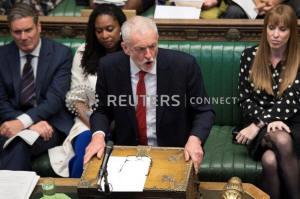UK's Labour vows to bring down PM Johnson and delay Brexit
 Send a link to a friend
Send a link to a friend
[August 15, 2019]
By Kate Holton
 LONDON (Reuters) - Britain's opposition
Labour Party began its campaign to bring down Prime Minister Boris
Johnson, urging lawmakers to back a no-confidence vote and unite behind
a caretaker government led by Jeremy Corbyn to prevent a no-deal Brexit. LONDON (Reuters) - Britain's opposition
Labour Party began its campaign to bring down Prime Minister Boris
Johnson, urging lawmakers to back a no-confidence vote and unite behind
a caretaker government led by Jeremy Corbyn to prevent a no-deal Brexit.
Johnson has promised to take Britain out of the European Union by Oct.
31, with or without a deal, setting the scene for a showdown in
parliament where lawmakers are opposed to a divorce without a transition
agreement.
However, the scale of the challenge facing anti-Brexit forces was
immediately made clear when the leader of pro-EU party the Liberal
Democrats described the proposal as nonsense and Labour leader Corbyn as
the wrong man for the job.
In a letter to opposition party leaders and several senior rebel
Conservatives, Corbyn said his "strictly time-limited temporary
government" would delay Brexit and hold an election.
He said Labour would then campaign in the election for a second
referendum on the Brexit terms, including an option as to whether
Britain should remain after all.

"This government has no mandate for No Deal, and the 2016 EU referendum
provided no mandate for No Deal," Corbyn said. "I therefore intend to
table a vote of no confidence at the earliest opportunity when we can be
confident of success."
A spokeswoman for Johnson's Downing Street office said the Labour leader
was showing contempt for the 2016 referendum. "Jeremy Corbyn believes
that the people are the servants and politicians can cancel public votes
they don't like," she said.
Lawmakers return from their summer break on Sept. 3 for a battle over
Brexit that will determine the fortunes of the world's fifth-largest
economy. Labour's business spokeswoman said a challenge in parliament
could come days later.
Johnson, who led the 2016 campaign to leave the EU, has staked his
premiership on getting Britain out by Oct. 31 and accused lawmakers
standing in his way of "collaborating" with Brussels. His approach has
prompted politicians from all sides to try to stop him but they have
failed yet to agree on a united way forward.
LOOMING SHOWDOWN
Johnson has a working majority in parliament of just one seat, including
several lawmakers who have said they could vote to bring down the
government.
Were the government to lose a no-confidence vote, lawmakers would have a
14-day period to try to form a new administration, otherwise a
parliamentary election would be called, which could be held after the
Oct. 31 exit date.
[to top of second column]
|

Britain's Labour Party leader Jeremy Corbyn speaks at the House of
Commons in London, Britain May 22, 2019. ©UK Parliament/Jessica
Taylor/Handout via REUTERS

Opponents of a sudden departure without a transition deal say it
would be a disaster for what was one of the West's most stable
democracies, shattering supply chains, damaging global growth, and
weakening Britain's standing in the world.
Brexit supporters say while there may be short-term disruption, it
would provide a clean break from the struggling bloc and eventually
allow the economy to thrive. The pound, which has tumbled in recent
weeks as the prospect of a turbulent exit has increased, was largely
unmoved by Corbyn's proposal.
Parliamentary votes have shown there is a small majority against a
no-deal Brexit. Corbyn, a low-key Remain campaigner during the 2016
referendum, has been under pressure within his party to step up
efforts to prevent it from happening.
He said he hoped his proposal to lead a caretaker government could
"halt the serious threat of No Deal, end the uncertainty and
disarray, and allow the public to decide the best way ahead."
But Corbyn, a veteran socialist, is a highly divisive figure in
parliament and could struggle to form a majority of his own.
While the political turmoil of the last year has led to an
unprecedented level of cross-party cooperation, many in Johnson's
Conservative Party and others would still find it difficult to vote
for a Corbyn-led administration.
In one of the first responses to Corbyn's proposal from a
Conservative politician, Alistair Burt, a former foreign office
minister who is opposed to a no-deal Brexit, said he could not
support the Labour leader.
Jo Swinson, the new leader of the pro-EU Liberal Democrat party
which has 14 lawmakers in the 650-seat parliament, said Corbyn could
not even secure the backing of his own party.
"I would expect there are people in his own party and indeed the
necessary Conservative backbenchers who would be unwilling to
support him," she said. "It is a nonsense."

Swinson said a more centrist politician such as the Conservative's
Ken Clarke or Labour's Harriet Harman could be capable of commanding
a majority across the House to navigate the country through Brexit.
(Editing by Guy Faulconbridge and Andrew Cawthorne)
[© 2019 Thomson Reuters. All rights
reserved.]
Copyright 2019 Reuters. All rights reserved. This material may not be published,
broadcast, rewritten or redistributed.
Thompson Reuters is solely responsible for this content. |